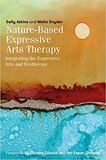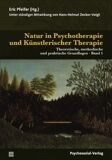|
This review considers a book centered on theories and models of social action art therapy and how it can work effectively for individuals and groups experiencing crisis. Drawing upon various ecologies, climate psychology, and eco-art therapy, this book addresses various responses to climate change, especially the role of imagination in creating alternative versions of the future. The review helps to understand how a social action approach to art therapy serves as a way of addressing the political and collective components of climate change as well as other moments of crisis, including asylum, refuge, and domestic abuse.
21.03.2023 15:23/read more...
This review outlines a book centered on the historic damages caused by the early colonizers of America and how their descendants may recognize and heal the harm done to the earth and Native peoples. Louise Dunlap tells the story of the beloved land in California’s Napa Valley: how the land fared during the onslaught of colonization and its consequences of drought and wildfires that are present today. She looks to awaken others to consider their ancestors’ role in colonization and encourage them to begin reparations for the harmful actions of those who came before. More broadly, the book offers a way for readers to evaluate their current life actions and the lasting impact they can have on society and the planet.
20.10.2022 12:19/read more...
This review outlines the book “Environmental Arts Therapy: The Wild Frontiers of the Heart”, as reflecting the development of new health-promoting approaches and types of psychological support based on the alliance of nature and the arts. The book is comprised of twelve chapters, divided into five parts. Part one maps out the shape of environmental arts therapy in literature and within the contemporary history of art therapy as it is practices in the British Isles. Part two integrates the theories of attachment and childhood emotional development into the practice of environmental art therapy. Part three explores notions of the feminine and masculine as they appear within relationships with the natural world. Part four focuses upon the theme of natural yearly cycles and how they relate to psychological processes of change. The final part brings ageing and palliative care into the picture. At various points in this collection of reports and reflections about environmental art therapy, climate crisis and environmental is explicitly addressed.
14.06.2021 08:49/read more...
In his response to the book by Sally Atkins and Melia Snyder, Stephen K. Levine not only notes the high merits of their writing, recognizing it as the best book that he has read on nature-based expressive arts therapy, but shares his personal experience in relation to the environment and nature. He notes the human need to set down roots, and also to go beyond the boundaries of our habitual environments.
31.05.2020 15:30/read more...
This review outlines a two-volume edition in German and English that reflects the current state of diverse psychotherapeutic and rehabilitation approaches that integrate therapeutic work with various aspects of the environment. The publication is one of the first basic works that introduces this relatively new area of therapeutic activity and psychosocial support.
30.05.2020 13:20/read more...
Publication of the book Environmental expressive therapies: nature-based theory and practice, edited by Alexander Kopytin and Madeline Rugh by the publisher Routledge is a significant event in the expressive art therapies milieu and related fields of the health-promoting practices based on the creative expression and human interaction with the environment.
14.02.2020 09:52/read more...
This review outlines Miller’s argument that the Daoist tradition offers an important perspective for ecological thought based on the pervasion of nature in human existence and the porosity of the human body. Somatic practices can build a basis for the aesthetic perception necessary for ecological action. The reviewer suggests that there is a possible convergence between Daoism and the thinking of poiesis that shows the importance of the creative and expressive arts in ecological theory and practice.
14.02.2020 09:49/read more...
|
In accordance with the Law of the Russian Federation on the Mass Media, the Federal Service for Supervision of Communications, Information Technology and Mass Communications (Roskomnadzor) on September 22, 2020, the web-based publication - The peer-reviewed scientific online journal "Ecopoiesis: Eco-Human Theory and Practice" was registered (registration number El No. FS77-79134).
“Ecopoiesis: Eco-Human Theory and Practice” is the international multidisciplinary Journal focused on building an eco-human paradigm, disseminating eco-human knowledge and technology based on the alliance of ecology, humanities and the arts. Our journal aims to be a vibrant forum of theories and practices aimed at harmonizing the relations of mankind and the natural world in the interests of sustainable development, the creation of Eco-Humanity as a new community of human beings and more-than-human world. The human being is an ecological being, not separate from the world. The Ecopoiesis journal is based on that premise and aims to develop a body of theory and practice within that framework.
The Journal promotes dialogue and cooperation between ecologists, philosophers, doctors, educators, psychologists, artists, musicians, designers, social activists, business representatives in the name of eco-human values, human health and well-being, in close connection with concern for the environment. The Journal supports the development and implementation of new environmentally-friendly concepts, technologies and practices in the various fields of health and public life, education and social work.
One of the priority tasks of the Journal is to demonstrate and support the significant role of the arts in their alliance with ecology and the humanities for the restoration and development of constructive relations with nature, raising environmental awareness and promoting nature-friendly lifestyles.
The Journal publishes articles describing new eco-human concepts and practices, technologies and applied research data at the intersection of humanities, ecology and the arts, as well as interviews and conference reports related to the emerging eco-human field. It encourages artwork, music and other creative products related to eco-human practices and the new global community of Eco-Humanity.





